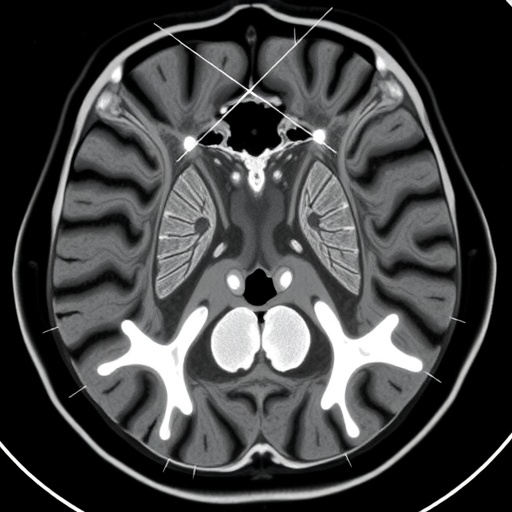In the ever-evolving landscape of medical imaging, pediatric radiology stands at the forefront of innovation, bridging the gap between advanced technology and the delicate needs of children. A groundbreaking study spearheaded by Zucker, Milshteyn, and Machado-Rivas introduces a revolutionary approach to enhancing the quality of magnetic resonance imaging (MRI) of the pediatric abdomen through deep learning reconstruction techniques. This study, published in Pediatric Radiology, showcases the potential of artificial intelligence (AI) to not only improve image quality but also to streamline the diagnostic process, offering promising implications for healthcare professionals working with younger patients.
The research delves into the realm of 3D T1 fast spoiled gradient echo (FGRE) acquisitions, a technique that has long been utilized for its superior anatomical detail in MRI scans. However, traditional imaging methods often grapple with issues such as noise, distortion, and artifacts that can obscure critical details in pediatric patients. This is particularly concerning since children may move during scans or may have difficulty staying still due to anxiety or discomfort. By implementing a deep learning reconstruction algorithm, the authors aimed to mitigate these challenges and deliver clearer, more informative images.
At the heart of this study lies the profound impact of deep learning, a subset of machine learning characterized by artificial neural networks designed to analyze vast amounts of data, recognize patterns, and make intelligent predictions. By training these networks on hundreds of MRI scans, the researchers developed a model capable of automatically enhancing image quality in pediatric abdomen MRIs. This process not only improves image clarity but also significantly reduces scan times, making the experience less taxing for young patients.
The team employed a large dataset of pediatric MRI scans to train their deep learning model, focusing specifically on the abdominal region, where clear imaging is crucial for accurate diagnosis and assessment. During the training phase, the model learned to identify and correct common MRI artifacts, enhancing the overall image resolution. By comparing traditional MRI outcomes with those enhanced by the deep learning algorithm, the researchers could quantify the improvement in diagnostic performance, ultimately advancing pediatric care.
In conducting their experiments, the researchers implemented rigorous validation processes to ensure the reliability of their findings. They evaluated the model’s performance across a diverse set of pediatric cases with varying conditions. Metrics such as signal-to-noise ratio and contrast-to-noise ratio were essential in determining the effectiveness of the deep learning reconstruction. The results were promising, indicating that AI-enhanced MRIs could significantly contribute to enhanced diagnostic accuracy in pediatric medicine.
The implications of this research extend beyond mere image enhancement. By integrating AI into the MRI workflow, clinicians are empowered to make faster and more precise diagnoses, ultimately improving patient outcomes. The ability to detect conditions such as tumors, cysts, or anatomical abnormalities with higher certainty holds the potential to revolutionize pediatric healthcare, where timely and accurate intervention is paramount.
Moreover, the study raises important discussions about the future of radiology in a digital era. As AI continues to permeate various aspects of medicine, radiologists must adapt to new technologies that redefine traditional practices. The collaboration between human expertise and advanced algorithms can lead to a synergistic relationship, allowing professionals to focus on intricate decision-making while efficiently utilizing AI for routine tasks.
Despite the remarkable advancements demonstrated in this study, it’s crucial to approach the application of deep learning in medical imaging with caution. Ethical considerations surrounding data privacy, algorithm biases, and the potential for over-reliance on technology must be addressed. Rigorous oversight and validation processes will be essential to ensure that the tools developed are beneficial and do not inadvertently compromise patient care.
As we explore the landscape of deep learning in radiology, the need for continued research cannot be overstated. Emerging developments in this field will likely pave the way for further enhancement of imaging techniques, allowing for even greater precision and clarity. Researchers like Zucker and colleagues are leading this charge, breaking new ground and setting the stage for the future of pediatric radiology.
In conclusion, the study highlights a significant leap forward in pediatric abdominal imaging, showcasing how deep learning reconstruction techniques can improve image quality and overall diagnostic capabilities. As the medical community embraces these advancements, there is optimism that such innovations will bring forth a holistic transformation in pediatric care, making the diagnostic process faster, easier, and, most importantly, safer for children. The future of imaging is bright, thanks to the pioneering efforts of researchers who dare to dream beyond conventional boundaries.
With each advancement in technology, the hope is to bring precision and efficiency into the pediatric imaging space, where the stakes are often higher due to the vulnerability of young patients. In an era where time is of the essence, such significant improvements in imaging not only promise better health outcomes but also enhance the overall experience for children undergoing medical evaluations. Indeed, the intersection of AI and pediatric radiology heralds a new dawn in healthcare, one where innovation fosters hope for a healthier future.
As the research landscape continues to evolve, the partnership between clinicians and technologists will play a pivotal role in shaping the next generation of medical imaging modalities. This collaboration will unlock new opportunities and refine practices that have long required significant labor and time, ultimately benefiting the one population that matters most: our children.
Subject of Research: Deep learning reconstruction for pediatric abdomen MRI improvement.
Article Title: Deep learning reconstruction for improving image quality of pediatric abdomen MRI using a 3D T1 fast spoiled gradient echo acquisition.
Article References: Zucker, E., Milshteyn, E., Machado-Rivas, F. et al. Deep learning reconstruction for improving image quality of pediatric abdomen MRI using a 3D T1 fast spoiled gradient echo acquisition. Pediatr Radiol (2025). https://doi.org/10.1007/s00247-025-06313-3
Image Credits: AI Generated
DOI: https://doi.org/10.1007/s00247-025-06313-3
Keywords: Deep learning, pediatric radiology, MRI, imaging techniques, artificial intelligence.




